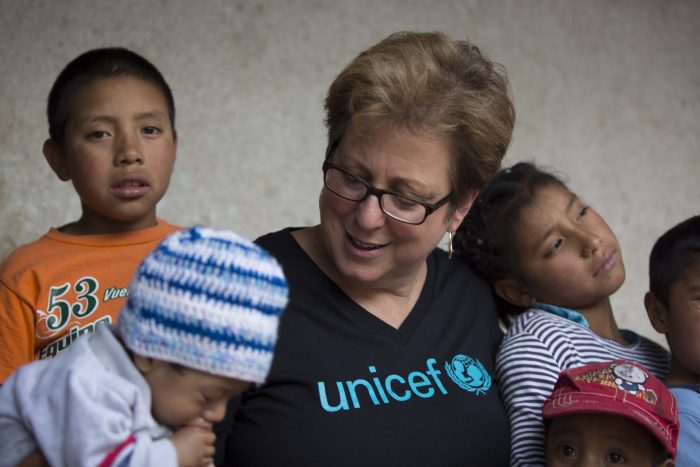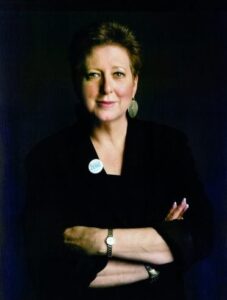Caryl M. Stern: Child Advocate
This is part of a series of Q&A posts with the leading experts who make up our Advisory Council, a group of hardworking ambassadors passionate about changing the face of disaster giving for the good of affected communities worldwide. How did you come to be on the Advisory Council and how long have you served […]

This is part of a series of Q&A posts with the leading experts who make up our Advisory Council, a group of hardworking ambassadors passionate about changing the face of disaster giving for the good of affected communities worldwide.

How did you come to be on the Advisory Council and how long have you served CDP in this capacity?
I spoke at a CDP meeting and after realizing that our missions are so intertwined, I was honored when I was invited to serve as an Advisory Council member. Over the past several years, I’ve seen first-hand how individual organizations can be part of a larger solution to support the world in times of disaster.
What expertise, background do you bring to CDP’s advisory council?
I have a perspective of almost 40 years in the nonprofit sector as a child advocate and civil rights activist. A unique element I bring to the table is that the U.S. Fund for UNICEF focusses on children- the most vulnerable in any disaster- and my participation forces us all to remember that fact. When supporting children, I believe everyone has something to give- even if they can’t contribute money, taking action and building awareness is also crucial.
What does the role entail for you? What do you contribute and also gain?
The role offers an opportunity for me to learn from others while sharing my experiences of working in times of disaster at U.S. Fund for UNICEF, particularly how we engage with donors. Every year, UNICEF responds to more than 250 emergencies—from conflicts to natural disasters. With more than 11,000 staff worldwide; 350 warehouses globally; strategic transit hubs in Copenhagen, Dubai, Panama and Shanghai; and a 24/7 emergency operations center in New York, UNICEF stands ready to provide both immediate and long-term necessities—food, water, shelter, protection and physical as well as mental health care—whenever a crisis arises. Since I joined U.S. Fund for UNICEF in 2005, we’ve weathered many large scale disasters, including the Haiti earthquake, East African drought, Nepal earthquakes, the Ebola crisis and most recently, Hurricane Matthew.
Being an Advisory Council member helps me to do my job at U.S. Fund for UNICEF by enhancing our relationships with partners so we are engaging with them regularly and not just in times of disaster. Additionally, I have been privileged to learn from the others who sit at the table – improving and honing my own skills and bringing new ideas back to U.S. Fund for UNICEF.
How does your participation make CDP a more effective organization, guiding our mission specifically while also advancing disaster philanthropy in general?
The Advisory Council allows us to hear what others are doing in the same space, to share lessons that we’ve learned and to collaborate with one another. The power of collaboration helps to amplify the needs better than as an individual organization.
Is there a story from the field, a specific disaster event or experience that shaped or changed how you approach your work and/or life?
In 2008, I was in Sierra Leone on a goodwill trip to raise awareness for eliminating maternal and neonatal tetanus (MNT) in developing countries. I had read the statistics which at the time read that 14,000 infants and 30,000 mothers were dying each year, but it wasn’t until I met a six-day-old baby girl, whose young mother had planned to name Fatima that I fully realized what this meant.
Fatima died before my very eyes from neonatal tetanus, with her mother sitting nearby. Fatima could have lived if she had access to the vaccine. It was one of the most horrible, heartbreaking things I have ever witnessed. I understood then the full horror and helplessness associated with child mortality, gaining more resolve than ever to bring the number of children dying each day all the way down to zero.

CDP benefits immensely from the guidance and knowledge of the Advisory Council. How do you and/or your organization benefit from your engagement with CDP?
CDP offers us insight into increasing donor effectiveness throughout the lifecycle of disasters, and it helps us to strategically think about educational and funding opportunities to put children first. Disasters require preparation, to help and respond in the most effective way possible, and this is woven into our work through fundraising, advocacy, and education at U.S. Fund for UNICEF.
Looking to the future, what trends or predictions do you have for disaster philanthropy or the humanitarian field in general?
I believe the global community is getting better at emergency preparation, and organizations like CDP are essential in bringing us together and showing how supporters can help in the most effective way.
I’m hopeful that the world will do a better job of seeing the ongoing emergencies, not just the imminent. We live in a world that has seen the greatest uprooting of children from their homes since World War II, often fleeing for their lives. Fighting for the survival and development of all children, in all situations, all of the time, matters now – more than ever.

